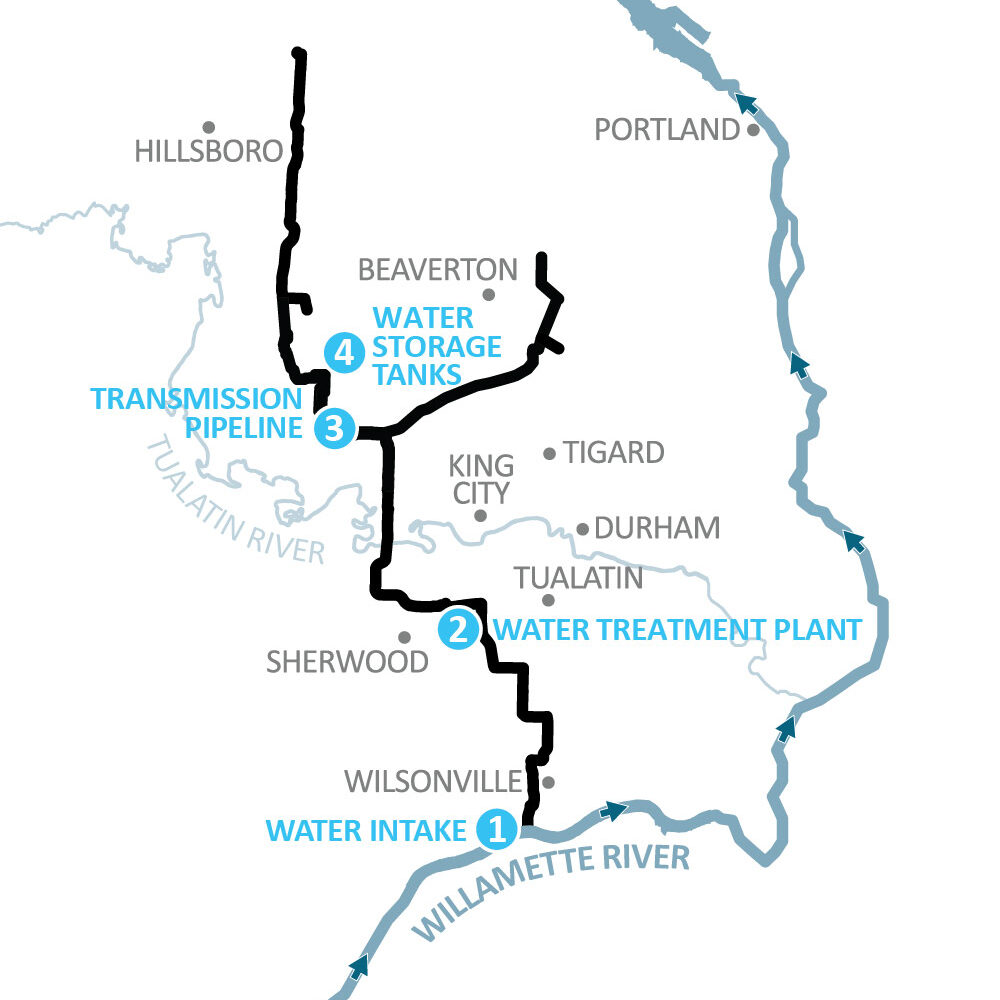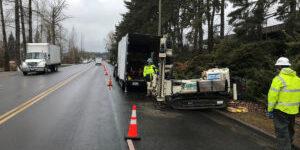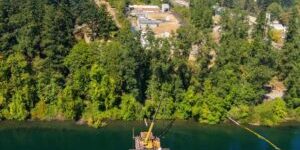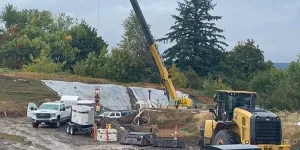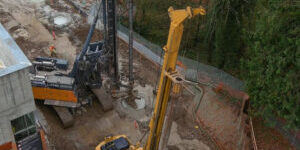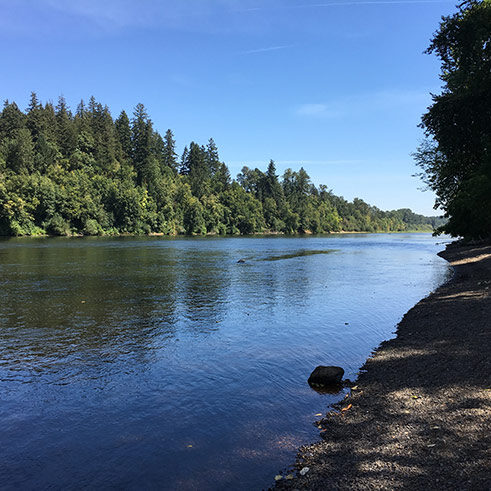
By Jim Redden and John William Howard. From the Portland Tribune.
North Portland company supplies large pipes for $1.2 billion Willamette Water Supply Program that us underway in Washington County
Westside suburbs are mounting a $1.2 billion project to take drinking water from the Willamette River, with a Portland company playing a major supporting role.
Northwest Pipe Co. has so far provided all of the pipe for the Willamette Water Supply Program, one of the largest public infrastructure projects ever undertaken in the region.
When it is completed, the project will draw water from the Willamette River in Wilsonville and provide it to communities in Washington County through more than 30 miles of pipe, a water treatment system, two reservoirs and numerous pumping stations.
Northwest Pipe, located in the Burgard Industrial Park in far North Portland, has won all three contracts awarded for the pipe so far. It is on track to produce 19,500 feet of pipe for the first three stages of the project. The sections ranges from 48 to 66 inches in diameter, and from 48 to 60 feet long.
World War II-era buildings
On a sunny late-October morning, plant manager George Ackley walked through the five huge metal-frame buildings where the pipe is being manufactured. Four were originally constructed to help build the Liberty Ships at the Portland Shipyards during World War II. Each is as long as several football fields and multiple stories high.
“It’s amazing to think what it must have been like out here at the height of wartime production,” said Ackley, who has been with the company for over 44 years.
During the tour, Ackley explained how huge slabs of rolled steel purchased by the company are twisted into the shape of large pipes on two massive machines, then welded at their seams to retain their shape.
“Think of it like a toilet paper tube,” Ackley said.
After the welds are x-rayed, the pipes are coated with polyethylene in a different building and lined with mortar by centrifugal force on a machine outside. Then they are filled with water and pressurized in another building to ensure their structural integrity. Many of the pipes are designed for specific locations along the route and must be modified with special fittings, including flanges and access points for manholes. All of that welding is x-rayed, too.
“Check after check after check,” Ackley said of the process to guarantee they will last 100 years or more with proper maintenance.
The pipes are moved around by overhead cranes and a massive forklift that also loads them on semi-truck trailers to be taken to where they will be buried along the route. The first stages are taking place where other projects are already underway, including South Hillsboro, the large new subdivision along Tualatin Valley Highway where thousands of new homes are beginning to be built.
Roots in Clackamas
Northwest Pipe Co. was founded as Northwest Pipe & Casting in 1967 in Clackamas. It acquired the North Portland manufacturing plant from Beall Pipe in 1982, and closed its Clackamas facility two years later. Today, the company has grown into an international supplier of pipes for water and wastewater projects. It has more than 500 employees and other manufacturing plants in Adelanto, California; Monterrey, Mexico; Parkersburg, West Virginia; and Saginaw, Texas. Its pipes have been used in projects around the world.
Despite its local roots, the Willamette Water Supply Project is the first time its products have been used in the region. The company is also bidding to provide the pipe for the Willamette River Crossing Project being planned by the Portland Water Bureau to build an earthquake-proof water line from the east to west side of the city.
Drinking from the Willamette
The Willamette Water Supply Program is a parnership between Hillsboro and the Tualatin Valley Water District, which serves more than 200,000 Washington County customers. When completed, the pipeline will run from the river to Hillsboro, with customers drawing water along the way.
The $1.2 billion cost of the project is just a little less than the Big Pipe project in Portland that reduced sewage overflows into the Willamette River, and a little less than TriMet’s MAX line between Portland and Milwaukie. It includes a water treatment plant and pump station in Sherwood and storage tanks near Cooper Mountain Nature Park in Beaverton.
Although the project will not be completed until 2026, workers are currently digging a trench for the section of the pipeline slated to pass under the coming Southeast Tualatin Valley Highway and follow Southwest Cornelius Pass Road all the way to Highway 26.
At the South Hillsboro site, a section of the 48-inch pipe is still visible at the bottom of a deep pit just south of TV Highway and Cornelius Pass Road, which is being extended south through the property where 8,000 homes and apartments will be built over the next decade.
Sharing with Portland?
The project is not simply designed to quench the thirst of future South Hillsboro residents and businesses. It was initiated to provide water to much of Washington County, which has been growing briskly for years. It was chosen over such other ideas as raising the federally-owned dam at Hagg Lake and buying more water from the Portland Water Bureau, which currently serves part of the county. In fact, planned interconnections will allow Portland to buy water from the project if the need arises.
At the South Hillsboro location, project managers worked with the Oregon Department of Transportation to reconfigure the intersection of Cornelius Pass and TV Highway to cut down on lane closures, limiting the impact on drivers. Future placement of the pipeline north of TV Highway will coincide with the planned widening of Cornelius Pass Road there.
“We’re building the pipeline before South Hillsboro is built,” said Andre Tolme, project manager.
Several other worksites are also underway along the pipeline route. In Sherwood, crews are blasting through a hillside to lay pipeline and extend Southwest 124th Avenue. They’ve already tunneled under railroad tracks. Steve Clapper, a supervisor with the pipeline project, says the blasted rock is being reused as roadbed to save on hauling costs.
The majority of the money spent on the project is staying in the region, a major selling point for the project partners. According to project documents, the partners have spent $41.3 million on the project so far. Most of that has gone to 85 local contractors and businesses.
Kerr Contractors is working on the 124th Avenue and South Hillsboro projects, the first two portions of pipeline construction.
Beginning in 2018, crews are scheduled to continue extending the pipeline from TV Highway to Southeast Frances Street in Hillsboro. Construction from Southwest Farmington Road is set to begin in 2019.
The longest stretch of the pipeline, a 7.7-mile section southwest of Beaverton, runs from Farmington Road south to Bull Mountain, and should begin construction in 2018.

